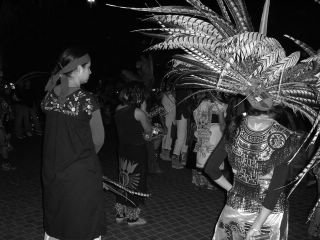
Many academics, psychologists and anthropologists have tried to figure out why so many Mexican Americans have recently become fascinated with the indigenous history of Mexico.
For decades, melting-pot theory enthusiasts have questioned the reluctance of young people of color to assimilate into the proverbial Main Street of American identity. But instead of heading towards Main Street, many young people in Los Angeles have turned away from it, opting instead to pave their own "calle".
In fact, many Chicanos have been found their way back to the "Alameda" (the Spanish culture's version of a Main Street), and have decided to go further into their past.
Historically, Mexicans were notorious for pretending to be recent descendants of Spain, evidencing the hopeless desire to be part of a Europe that did not always reciprocate the gesture. Mexico developed such an intense romance with the Iberian peninsula, that even today some urban dark-skinned Mexicans fruitlessly make the 10-minute argument to explain how one of their great aunts spoke with a Spanish lisp and dressed in traditional Sevilla attire. For years, many Mexican Americans felt that the only way to advance in America's social mobility game was to adopt a country in Europe and hope to be invited to the next PTA potluck down Oak Drive. Fortunately for Latinos in Los Angeles, the recent move towards the indigenous history of Mexico provides a fresh outlook on their Mexican identity.
No longer must a Mexican American stare up into the sky and try to figure out what part of the Iberian peninsula his last name came from, and try to claim a distant land that cares little about the issues he confronts daily. The Chicano movement and its commitment to the indigenous history of Mexico leapfrogs backwards, going "back to the future" if you will, to a place where Iberian descendants did not even exist.
Interestingly, many of the elite Mexicans that clearly have no indigenous heritage are reluctant to embrace this newfound desire to be Indio, Indian and India. It is difficult for them to see and understand how what was once a derogatory word that they were able to control and use, has now become a term of empowerment and pride.
Now more than ever, children of some Latinos are not necessarily given names like Kevin or Michael, or Juan or Roberto, but more political and indigenous names like Tonatiu and Moctezuma. Many of these developments are not entirely new, but for the first time in decades these cultural waves are finally leaving an imprint.
We can only hope that Mexican Americans continue to pioneer this new kind of American identity, one that focuses on the whole story, from the Amerindian to the European and from the African to the Asian. The more choices and flavors people have to choose from, the more colorful our American heritage will be.


No hay comentarios.:
Publicar un comentario